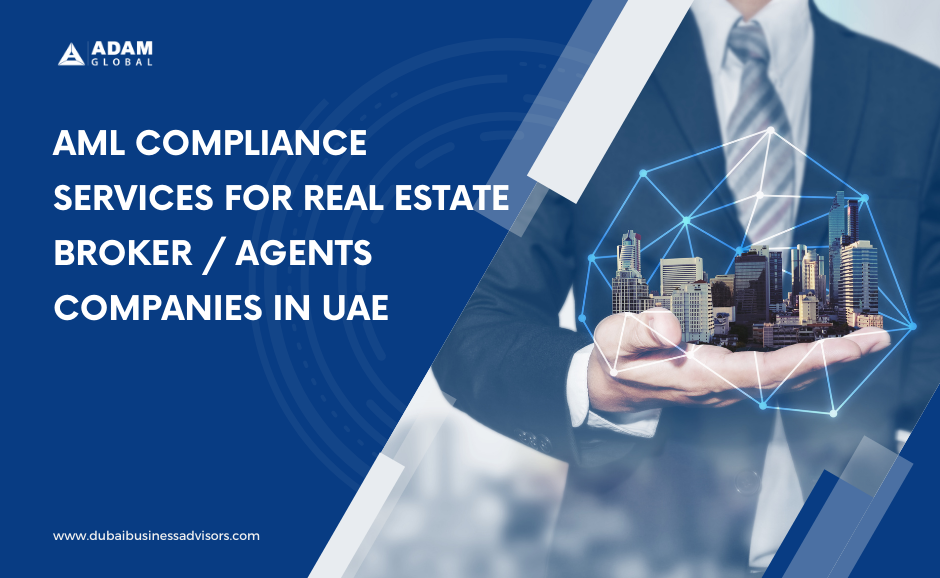As the real estate sector continues to boom in the United Arab Emirates (UAE), so do the risks associated with money laundering. Money laundering is a serious crime that can have negative consequences on the financial system, the economy, and society as a whole. To mitigate these risks, the UAE has implemented robust anti-money laundering (AML) regulations for DNFBP among which the real estate sector is one to comply with. At Adam Global, we provide AML compliance services for real estate sectors in the UAE to help them comply with these regulations and prevent money laundering activities.
Why is AML Compliance Important?
AML compliance is crucial for real estate agents in the UAE to prevent their businesses from being used to launder illicit funds. Real estate transactions are attractive to money launderers due to their high value, and they may use various methods to conceal the illicit origin of the funds. AML compliance can help identify and prevent such activities, protecting the integrity of the real estate sector and the UAE’s economy as a whole.
AML compliance is important for various reasons, including the following:
- Prevention of money laundering: AML compliance measures are designed to prevent money laundering activities, which can have negative impacts on economies, communities, and individuals. Money laundering activities can fund criminal organizations, terrorism, and other illicit activities.
- Protection of businesses and individuals: AML compliance measures can protect businesses and individuals from the negative impacts of money laundering activities. These impacts can include reputational damage, legal consequences, and financial loss.
- Compliance with regulatory requirements: AML compliance is required by law in many countries, including the UAE. Failure to comply with AML regulations can result in fines, legal action, and damage to the company’s reputation.
- Enhance due diligence: AML compliance measures can enhance due diligence for businesses, ensuring that they are dealing with legitimate customers and transactions. This can reduce the risk of financial crime and fraud.
- Promote ethical business practices: AML compliance measures promote ethical business practices by preventing businesses from engaging in or facilitating criminal activities. This can improve business relationships with stakeholders, including customers, investors, and regulators.
By implementing effective AML compliance measures, businesses can prevent money laundering activities, protect themselves and their stakeholders, comply with regulatory requirements, enhance due diligence, and promote ethical business practices
u003cstrongu003eBenefits of AML Compliance for Real Estate Agentsu003c/strongu003e
AML compliance is crucial for real estate sectors and estate agents in the UAE to prevent their businesses from being used to launder illicit funds. The following are some benefits of AML compliance for the real estate sector:u003cbru003eu003cstrongu003eMitigate legal and reputational risksu003c/strongu003e: Real estate sectors that comply with AML regulations can mitigate legal and reputational risks associated with money laundering activities. Failure to comply with AML regulations can result in fines, legal action, and damage to the company’s reputation.u003cbru003eu003cstrongu003eEnhance due diligenceu003c/strongu003e: AML compliance measures can enhance due diligence for real estate. Effective customer due diligence measures can ensure that the company is dealing with legitimate customers, reducing the risk of money laundering activities.u003cbru003eu003cstrongu003eImprove business relationshipsu003c/strongu003e: AML compliance can improve business relationships with stakeholders, including customers, investors, and regulators. Compliance with AML regulations can demonstrate the company’s commitment to ethical business practices and compliance with regulatory requirements.u003cbru003eu003cstrongu003ePrevent the loss of businessu003c/strongu003e: Non-compliance with AML regulations can result in loss of business, as customers and investors may choose to work with companies that have better AML compliance measures in place.u003cbru003eu003cstrongu003eProtect the economyu003c/strongu003e: AML compliance can protect the UAE’s economy by preventing money laundering activities that can have a negative impact on economic stability and growth.
u003cstrongu003eReal Estate Transactions That Create Suspicions of Money Launderingu003c/strongu003e
Real estate transactions that involve high-value properties or cash payments are more likely to create suspicions of money laundering. Additionally, transactions involving politically exposed persons (PEPs) or individuals with links to sanctioned countries or organizations may also raise red flags. The following are some examples of real estate transactions that may create suspicions of money laundering:u003cbru003eu003cstrongu003eHigh-value property transactionsu003c/strongu003e: Real estate transactions involving high-value properties, such as luxury villas or commercial buildings, may create suspicions of money laundering. Money launderers may use high-value properties to move large amounts of illicit funds.u003cbru003eu003cstrongu003eCash paymentsu003c/strongu003e: Real estate transactions involving cash payments may also create suspicions of money laundering. Cash payments do not leave a trail that can be traced back to the launderer, making them an attractive option for money launderers.u003cbru003eu003cstrongu003eTransactions involving PEPsu003c/strongu003e: Real estate transactions involving PEPs, such as government officials or their family members, may also raise red flags. PEPs are considered a higher risk due to their access to public funds and the potential for corruption.u003cbru003eu003cstrongu003eTransactions involving sanctioned countries or organizationsu003c/strongu003e: Real estate transactions involving individuals or entities with links to sanctioned countries or organizations may also create suspicions of money laundering. Sanctioned countries or organizations may be involved in illicit activities such as terrorism or drug trafficking.u003cbru003eu003cstrongu003eu003ca href=u0022https://www.fatf-gafi.org/en/publications/High-risk-and-other-monitored-jurisdictions/Increased-monitoring-february-2023.htmlu0022 data-type=u0022URLu0022 data-id=u0022https://www.fatf-gafi.org/en/publications/High-risk-and-other-monitored-jurisdictions/Increased-monitoring-february-2023.htmlu0022u003eA transaction involving high-risk countriesu003c/au003e u003c/strongu003e(Albania , Barbados , Burkina Faso , Cambodia , Cayman Islands , Democratic Republic of the Congo , Gibraltar , Haiti , Jamaica , Jordan , Mali , Morocco , Mozambique , Nigeria, , Panama , Philippines , Senegal , South Africa,South Sudan ,Syria , Tanzania , Türkiye , Uganda , United Arab Emirates , Yemen):u003cbru003eBy being aware of these types of transactions, real estate agents in the UAE can better identify and prevent money laundering activities.
AML Regulations for the Real Estate Sector in UAE
The UAE has implemented strict AML regulations for the real estate sector to prevent money laundering activities. The Ministry of Economy oversees the AML compliance of real estate agents in Dubai, and these regulations require real estate agents to implement AML compliance measures, including customer due diligence, transaction monitoring, and reporting suspicious transactions to the relevant authorities. The following are the key AML regulations for the real estate sector in the UAE:
- Customer Due Diligence (CDD): real estate agents in the UAE are required to implement effective CDD measures to verify the identity of customers and assess the risks associated with the transaction. CDD measures should include collecting and verifying customer identification information, conducting ongoing monitoring of customers and commerce, and assessing the risks associated with the customer and transaction.
- Enhanced Due Diligence (EDD): real estate agents should conduct EDD on high-risk customers and transactions. This may include conducting additional background checks, obtaining additional documentation, or obtaining independent verification of the customer’s identity or source of funds.
- Transaction Monitoring: real estate agents should implement transaction monitoring systems to detect and report suspicious activity. Transaction monitoring systems should include threshold monitoring, which involves monitoring for transactions above a certain value, and behavioural monitoring, which involves monitoring for unusual or suspicious patterns of transactions.
- Reporting Suspicious Activity: real estate agents are required to report suspicious transactions to the relevant authorities, including the Financial Intelligence Unit (FIU) of the UAE and the DLD. Suspicious transactions may include transactions involving high-value properties, cash payments, or individuals with links to sanctioned countries or organizations.
- Record Keeping: real estate agents must keep records of all transactions, including customer identification information, transaction details, and copies of relevant documentation. These records must be kept for a minimum of five years.
By complying with these AML regulations, real estate agents in the UAE can effectively prevent money laundering activities and reduce their risk of legal and reputational damage.
The Red Flags of Money-Laundering
Real estate agents in the UAE should implement AML compliance measures that align with international standards to effectively identify potential money-laundering risks. The following are the standards to identify potential money-laundering risks:
The regulations issued by the Ministry of Economy to combat money laundering in accordance with the guidelines issued by the financial action task force for its member countries.
- Unusual transaction patterns: Transactions that are unusual in terms of their size, frequency, or type, may indicate that someone is attempting to launder money.
- Transactions involving high-risk countries: Transactions involving individuals or companies based in countries that are known for their high levels of corruption or illegal activity may also be a red flag.
- Unexplained funds: If a customer has funds that cannot be accounted for or that have no apparent legitimate source, this may indicate that the funds are the proceeds of illegal activity.
- Large cash deposits or withdrawals: Large cash transactions, particularly those that are made frequently or in high amounts, may be indicative of money laundering.
- Use of third parties: The use of third parties to conduct transactions or to open accounts can be a red flag for money laundering, particularly if the third party has no clear relationship with the customer or if the third party is located in a high-risk country.
- Lack of business activity: Companies that have no clear business activity, or that are not engaged in legitimate trade, may be used as a front for money laundering.
It is important to note that the presence of one or more of these red flags does not necessarily indicate that money laundering is taking place. However, they may trigger additional scrutiny and investigation by authorities to ensure compliance with AML laws and regulations
AML Compliance Services you can get with Adam Global
AML (Anti-Money Laundering) compliance is a critical requirement for businesses, particularly those in the financial and legal sectors, to prevent their services from being used to facilitate illicit financial activities. Adam Global offers a range of AML compliance services to assist businesses in meeting regulatory requirements, managing risk, and protecting their reputation.
- Documentation of AML policies – One of the essential services provided by Adam Global is the documentation of AML policies. A robust and effective AML policy is the foundation of any successful AML compliance program. Adam Global’s team of experts can help businesses to develop comprehensive AML policies that are in line with regulatory requirements and industry best practices.
- AML training – AML training is another crucial service provided by Adam Global. Educating employees on AML regulations and how to identify and report suspicious transactions is an essential component of any effective AML compliance program. Adam Global can provide AML training to employees at all levels, ensuring that they are equipped with the knowledge and skills necessary to meet regulatory requirements.
- Annual AML assessment report – Annual AML assessment reports are a critical component of AML compliance. They help businesses to identify weaknesses in their AML compliance programs and implement remedial actions to address these weaknesses. Adam Global can assist businesses in preparing annual AML assessment reports that are comprehensive, accurate, and in line with regulatory requirements.
- In-house AML compliance department setup – In-house AML compliance department setup is another service offered by Adam Global. This service is particularly useful for businesses that do not have an in-house AML compliance department. Adam Global can help businesses to establish an AML compliance department that is tailored to their specific needs, ensuring that they have the necessary infrastructure, policies, procedures, and personnel to meet regulatory requirements.
- AML software selection – AML software selection is another essential service provided by Adam Global. There are many AML software solutions available on the market, each with its own strengths and weaknesses. We can assist businesses in selecting the most appropriate AML software solution that is in line with their specific needs and budget.
- AML health check – AML health checks are periodic assessments of a business’s AML compliance program. These assessments help businesses to identify weaknesses and opportunities for improvement in their AML compliance programs. Adam Global can provide AML health checks that are comprehensive, accurate, and in line with regulatory requirements.
- AML risk assessment – AML risk assessments are another critical component of AML compliance. AML risk assessments help businesses to identify and assess the risk of money laundering and terrorist financing associated with their products, services, customers, and geographic locations.
- Regulatory reporting – Regulatory reporting is a mandatory requirement for businesses that are subject to AML regulations. Regulatory reporting involves submitting reports on suspicious transactions to the relevant authorities. Adam Global can assist businesses in preparing and submitting regulatory reports that are comprehensive, accurate, and in line with regulatory requirements.
- Managed KYC and customer due diligence report – Managed KYC (Know Your Customer) and customer due diligence reports are another service offered by Adam Global. KYC and customer due diligence are essential requirements for businesses that are subject to AML regulations. Adam Global can assist businesses in conducting KYC and customer due diligence checks that are comprehensive, accurate, and in line with regulatory requirements.
In conclusion, AML compliance is crucial for real estate agents in the UAE to prevent their businesses from being used to launder illicit funds. By implementing AML compliance measures, real estate agents can mitigate legal and reputational risks, enhance due diligence, and improve business relationships with stakeholders. The UAE has implemented strict AML regulations for the real estate sector, which real estate agents should comply with to prevent money laundering activities. At Adam Global, we provide AML compliance services for real estate agents in the UAE, helping them implement effective AML compliance measures and reduce their risk of money laundering activities.
Ms. Kriti Sinha, a highly accomplished professional, excels in compliance and the legal sector. As a Certified Anti Money Laundering Analyst (CAMA), she showcases her expertise in AML analysis. Kriti’s qualifications include being a qualified Company Secretary and possessing a Bachelor’s degree in Law, enhancing her ability to guide organizations in legal and regulatory compliance. With a background in Accountancy, she understands the financial aspects of money laundering schemes. Over eight years of experience, Kriti has advised organizations on regulatory compliance, risk assessment, and AML program implementation. She stays updated on AML regulations and engages in professional development, ensuring she remains at the forefront of her field. Kriti’s strong work ethic, attention to detail, and excellent communication skills make her a valuable asset in collaborative environments. Her certifications and qualifications demonstrate her versatility and expertise, enabling her to provide comprehensive solutions for organizations in navigating AML and regulatory compliance. For enquiries and free consultation :Email: info@dubaibusinessadvisors.com Mobile : +971 56 501 4164



